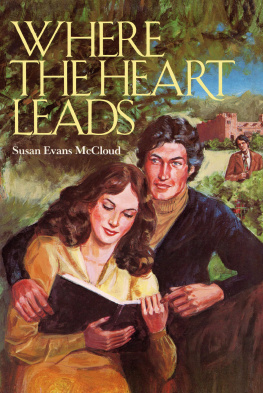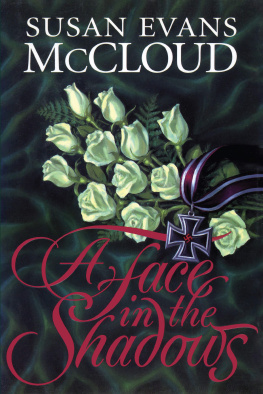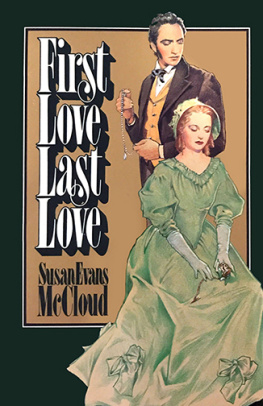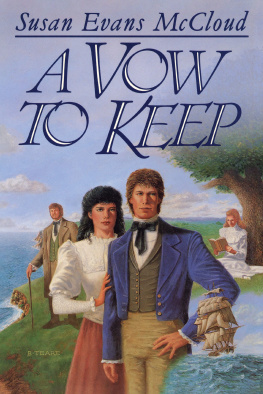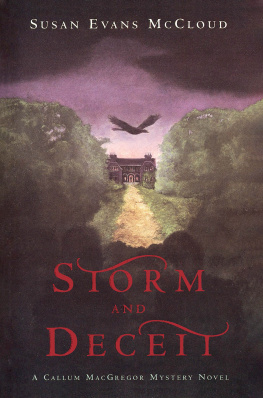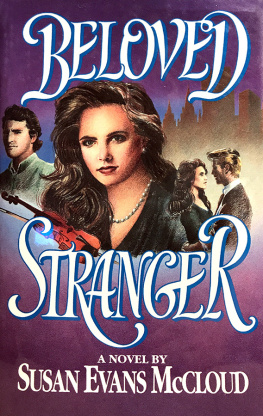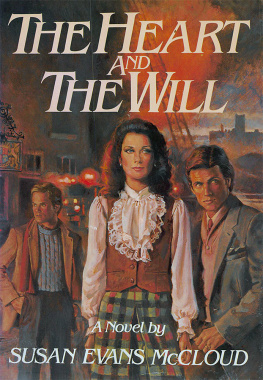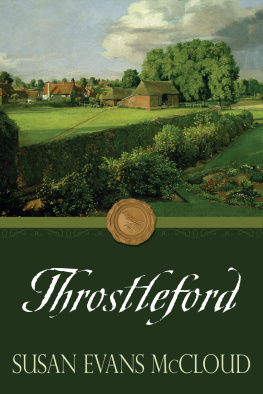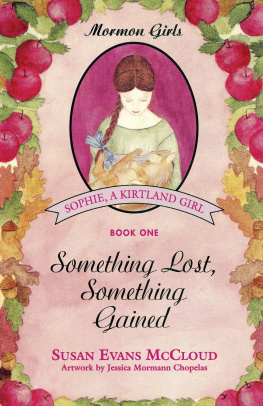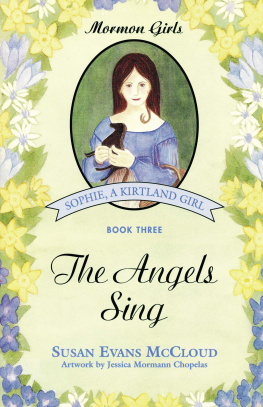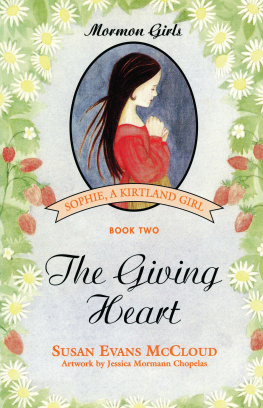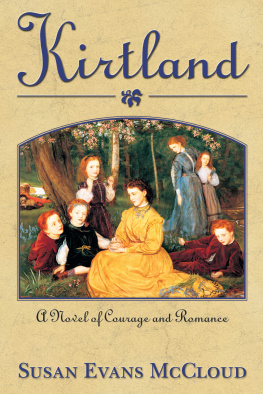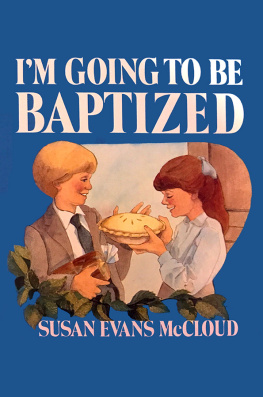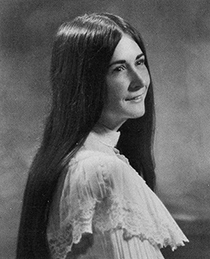ABOUT THE AUTHOR
Susan Evans McCloud brought to the preparation of this book an impressive writing background. This includes several published poems, local newspaper feature writing, lyrics to a score of songs, narratives for several tapes and a series of filmstrips, including the award-winning John Bakers Last Race. She is listed in several international biographies of writers of distinction.
The author was born in Utah and raised there and in Illinois. She is active in the LDS Church, much of her writing having been done for the seminary program; a long-time Relief Society teacher; and a hostess and tour guide at the Beehive House in Salt Lake City. She is married to James W. McCloud, and the couple live with their five children in Provo, Utah.
1979 Bookcraft, Inc.
All rights reserved. No part of this book may be reproduced in any form or by any means without permission in writing from the publisher, Deseret Book Company, at permissions@ deseretbook.com or PO Box 30178, Salt Lake City, Utah 84130. This work is not an official publication of The Church of Jesus Christ of Latter-day Saints. The views expressed herein are the responsibility of the author and do not necessarily represent the position of the Church or of Deseret Book Company.
Deseret Book is a registered trademark of Deseret Book Company. Visit us at deseretbook.com
First printing in hardbound 1979 First printing in paperbound 1990
Library of Congress Cataloging-in-Publication Data
ISBN 978-0-88494-381-5 (hardbound)
ISBN 978-0-88494-743-1 (paperback)
ISBN 978-1-62972-699-1 (paperback)
eISBN 978-1-62973-857-4 (eBook)
Printed in the United States of America Alexanders Print Advantage, Lindon, UT
JIT
To James Wylie
through whom I have become myself
and realized the vision...
ACKNOWLEDGMENTS
The author wishes to extend special thanks to the staff of the LDS Genealogical Library; to Gregory L. Seal for counsel on legalities and his concise, creative handling of the Buchanan wills; to Dr. and Mrs. Jack Johnson, both for medical advice and for the gracious use of their St. George home as a family retreat near the time of the completion of the book; to Brian and Tayva Patch for their sensitive, valuable advice and criticism in reading the manuscript as it was written; to James Russell, the "Scottish connection"; to George Bickerstaff, the "Sassenach" in the project; and most especially to James, Heather, Jennie, Jared, Rebeccah and Morag McCloud, without whose willing and patient sacrifice this book would never have come to fruition.
O Time, thou must untangle this, not I;
It is too hard a knot for me t' untie!
Shakespeare, TWELFTH NIGHT
| And, by that destiny, to perform an act
Whereof what's past is prologue; what to come,
In my discharge. THE TEMPEST |
"It's something you must do, Andrew, and you know it. The plans are all laid. In the morning you leave, and that's that."
"If it were only as simple as you make it sound." Andrew squinted at Edwin against the sun. In the distance he could see the long silver streak that was Loch Lomond and, further yet, the uneven greens and grays of the hills. Ben Lomond stood grandly above them all, and Andrew noticed, with unusual clarity, the stray fragments of clouds that shifted and stirred along its green flanks. He realized, suddenly, that in all his twenty-four years he had never been very far from home. Was that part, then, of the uneasiness inside him?
"She's confined herself to her rooms," Andrew said to his cousin," and refuses to come out."
"Your mother? You know her reasons well, Andrew. Actually, I think the sooner you're off, the better. Once it's really over it will be easier for her to accept."
"Without you I wouldn't be leaving them at all. You know that, don't you, Edwin?"
"It'll be my charm you're meaning, Andrew." Edwin's dark eyes lit with just a twinge of the mischief Andrew knew so well. "I've always had a way with the lassies."
"Especially Mother."
"Aye, but only because I'm so like yourself."
"Well, she loves you and trusts you, and"
"And there's no call for fancy speech-making between us, Andrew. I'm off to the house to see Janet. If there's any appreciation to be shown, I'd far rather it come from her than from you."
Andrew couldn't help smiling as he watched Edwin stride off across the grass. He was charming! He had always had an easy, natural charm that he seemed able to manipulate at will. He turned now and spoke over his shoulder, his merriment spreading from his eyes into his voice.
"It's a rare opportunity to be able to step into your shoes, Andrewa rare opportunity."
"Off with you! Tell Janet I'll be in for dinner."
Edwin whistled as he walked away, and Andrew was struck with the amazing likeness between himself and this younger cousin. Edwin was a little lighter of frame, more lean of build, but he had the same blue eyes, so dark that at times they seemed black in their intensity, and the mane of thick, black hair, a definite Buchanan legacy.
But there was more. Something about the arrangement of his facethe fine, narrow nose, the line of the chin, the deepset eyes beneath a jutting forehead. It was uncanny. How often had schoolteachers mistaken them for brothers when they were boys? How often had he looked at Edwin and seen mirrored the same expressions he felt on his own face: the set of his jaw, the lift of an eyebrow, the smile that began, almost reluctantly, at the comers of his mouth? He'd never enjoyed the dubious honor of being Edwin's look-alike before. But maybe now it would serve some good purpose at last.
He turned, and walked down to the pond, away from the house. Bieldmor House, named by the original Andrew from the Gaelic, meaning great shelterwhich, indeed, it was: warm and massive and secure, sheltered by the little valley in which it sat and by the winding line of trees which further screened it from wind and storm and intrusion.
As Andrew walked, the acres spread around him, seeming to en fold him with a sense of strength and security. Six miles down the road in Paisley stood his father's mills. There were five mills if one counted the water works further up on the River Clyde. How many was it now? Four hundred and seventy-nine employees who turned out some of the finest thread and woven goods that were shipped all over the continent, and to Canada and America as well. And he mustn't forget the holdings in Lancashire, and the interest in the Glasgow National Bank. Wealth and influence Andrew was to inherit; and because of this he was boarding a plane in the morning to begin an incredible search in obedience to a decree whose iron hand could thus control his actions down the span of six generations.
Andrew Buchanan. The Andrew Buchanan, who founded the Canonaich Mills and Cotton Works in 1823. A weaver, himself, since the age of thirteen, he had shown amazing thrift and determination. Bit by bit he had saved enough to begin to employ others and establish himself as a manufacturer.
With a loan from his wife's father, the original Andrew became a large-scale dealer in fine cotton cloths and in what were called " fancy goods" as well: muslins and silk gauzes, cambric and lawn. The industry was then at its height, with 177 cotton factories in the Clyde Valley alone, success just begging to be purchased with a little industry and skill. Andrew possessed both qualities in abundance, and within ten years his three factories boasted 350 men and women operating 17,000 spindles and 264 steam-powered looms.

